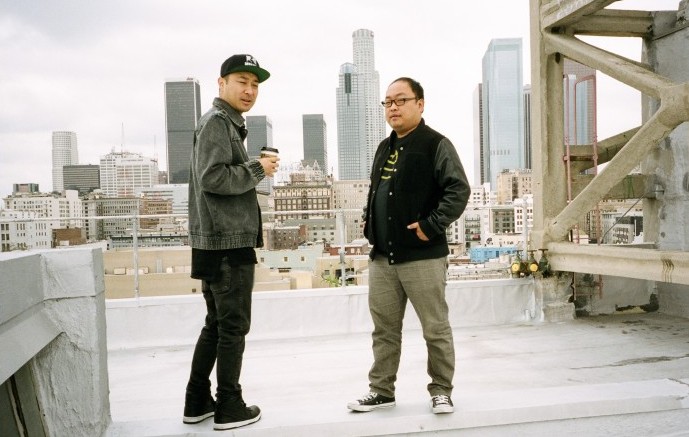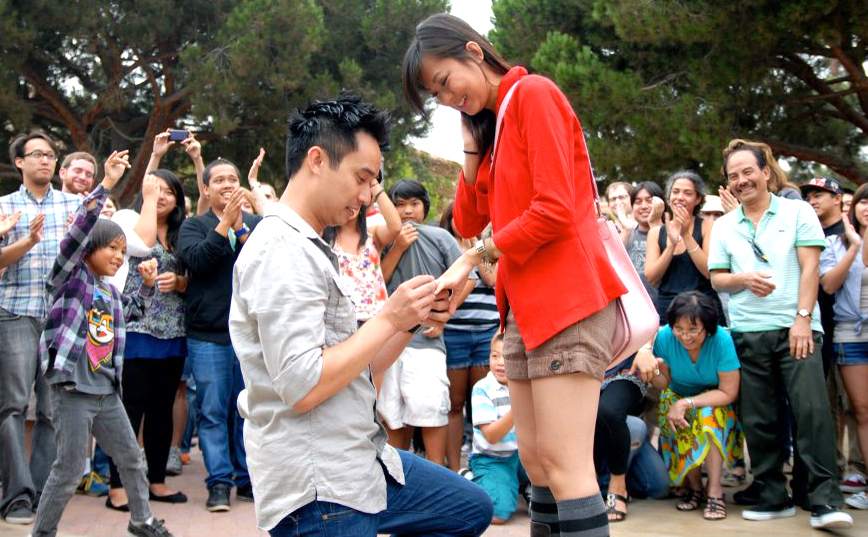Pictured above: Ktown Cowboys’ director Daniel Park (left) and actor-writer Danny Cho. (Photo by Mike Lee)
by REERA YOO | @reeraboo
editor@charactermedia.com
If you need a crash course in navigating the mystifying nightlife of Los Angeles’ Koreatown, then look no further than bromantic indie dramedy, Ktown Cowboys.
Directed by Daniel “DPD” Park, who created the web series of the same name, the Entourage-like film unravels like a cinematic guide to a night out in one of L.A.’s trendiest neighborhoods, complete with karaoke hostesses, “booking” clubs, after-hours soju bars and a secret Korean Uber service that drives intoxicated customers home.
In addition to its visual pageantry of excess, Ktown Cowboys (partly influenced by the Hollywood dramedy, Swingers ), is an adult-coming-of-age story that follows around five Korean American male besties in their late 20s who struggle with transitioning into adulthood and sort out life issues over rounds of Hite and soju in K-town’s late-night spots.
Although the film made its world premiere March 15 at South by Southwest in Austin, Tex., the film will be coming full circle on April 25, when it opens to a Los Angeles crowd at the Los Angeles Asian Pacific Film Festival. Park says his film, which plays out like a sleek music video with gorgeous lens flares and a hypnotic soundtrack, is meant to celebrate the idiosyncrasies of his hometown.
“There’s a certain mystery about K-town when you expose people to it for the first time. It’s exciting,” Park says, during an interview with KoreAm at Tom ‘N Toms café, shortly before SXSW.
Unapologetically raunchy with melodramatic beats, Ktown Cowboys puts its characters in slapstick predicaments, mostly involving awkward or sexual situations. But each is pursuing an American Dream that’s hindered by the cultural obstacles of growing up as a Korean American.
 (Photo courtesy of Ktown Cowboys)
(Photo courtesy of Ktown Cowboys)
The film stars Shane Yoon (“Jason”), who plays the reluctant heir to his family-run company, which is on the brink of collapse thanks to an embezzlement scheme perpetrated by the CFO; Sunn Wee (“Sunny”), an aspiring entrepreneur who dutifully runs his ailing father’s liquor store; Danny Cho (“Danny”), a business consultant who quits his job to pursue comedy; Peter Jae (“Peter”), a studying fashion design; and Bobby Choy (“Robby”), also known as Big Phony, plays an adoptee stuck in a dead-end job who struggles to connect with his Korean roots.
As the original web series centered on the camaraderie of hard-partying Korean American buddies, Park thought it was fitting to cast his friends—even though most of them were not professional actors (the film features the same principal cast).
“All I wanted to do was find a group of friends that were genuinely friends and capture [that] energy,” he says. “I knew the guys. I thought they all had different personalities that balanced each other out, [and] that was really fun to watch.”
Five years ago, Ktown Cowboys was merely a web series shot on a shoestring budget. Park and Danny Cho, the series’ writer and co-star, were inspired to create the series based on Cho’s stand-up comedy sketch on YouTube, in which he dresses in drag and mimics a “K-town girl” accent, a combination of Valley Girl and Korean.
The longtime friends decided it would be worthwhile to make a more in-depth series based on their high school and college experiences, despite having no prior experience in narrative filmmaking. Back then, Cho was hustling as an up-and-coming comedian after quitting his day job as a business consultant, while Park created online content for recording artists.
DPD (left) and Danny Cho. (Photo by Mike Lee)
“We had no idea what we were doing,” Park admits. “We had never done any video stuff before, so we just wanted to try it. It was the first time we had ever [attempted to portray] K-town in a narrative format.”
The Ktown Cowboys web series quickly earned a cult following for its light-hearted cultural tips, such as how to use the honorifics hyung and oppa (“older brother,” depending on the gender using it), and which songs not to sing at karaoke (beware of ‘80s Korean ballads). The series grabbed the attention of Korean American Hollywood veterans, including Ken Jeong (the film’s executive producer) and actors Daniel Dae Kim and Steve Byrne, all of whom make cameos in the feature film.
Yet, despite the enthusiasm over the web series, Park was initially reluctant to create additional narrative content, due to some major life changes shortly after the web series’ release. In early 2010, he had broken up with his girlfriend, who edited the web series, quit the multimedia company he was previously working for and started a video production company with the band, Far East Movement. Park toured with the band for a full year during their “Like a G6” promotional campaign, just as Ktown Cowboys webisodes began airing on YouTube.
It was only after Cho found financiers interested in funding a Ktown Cowboys movie for about a million dollars that Park had a change of heart. But, by this time, four years had passed since the web series’ peak, and Park, having reached his early 30s, felt like he had outgrown the partying scene.
“When I made the web series, it was already based on memories of when I was younger. So, by the time I was shooting, I was already 31, maybe 32?” the director says. “And I was starting to feel silly about making a movie about just partying and f—ing around.”
That’s when Park decided to try giving his characters more depth. “Everyone else liked the idea of also bringing in another side to who these [characters] are,” he says. “What do these people who party in K-town do during the day?”
The question led Park and the screenwriters to base the characters’ narrative arcs on the actors’ real-life experiences, the bulk of which focus on the harsh realities of turning 30 and meeting the expectations of their Korean immigrant families.
Park’s own family immigrated to the U.S. from South Korea with “$700 in their pockets and a minimal understanding of English,” the director writes in a statement. “Although we eventually moved out of K-town, my grandparents, my friends and my heart remained there.”
“I think when you see the characters with their jobs and their family situations, [the film] is very, very relatable to Korean Americans,” Park tells KoreAm. “Sunn, the guy who plays Sunny, for example, that’s his liquor store in the movie. That’s his family liquor store that he’s running with his dad, but he hates it. He hates working at a liquor store.”
“Being a Korean American kid, you are your family’s retirement plan,” Park continues. “You kind of have that [thought] at the back of your mind: ‘I need to be able to support my parents and my family eventually.’ There’s that pressure. Some of that is kind of what you see happening to the characters subconsciously.”
There will undoubtedly be people who criticize the film for portraying Asians in a certain, hard-partying light, Park says. But regardless of whether the film is well-received or panned, the director believes that simply creating the film was the most important part for him.
“I’m just really thankful and happy that we had the chance to make this. It really was a community effort,” he says. “I came from a total non-film background. I picked up a 5D with a couple of friends one day and said, ‘F—k it, let’s make this thing about K-town.”
Watch the theatrical trailer for Ktown Cowboys below:
KoreAm Journal is giving away 5 tickets for the Los Angeles Asian Pacific Film Festival screening of Ktown Cowboys on Saturday, April 25. Learn how to enter the giveaway here.
See Also
“The Boys of Ktown” – KoreAm Journal’s July 2010 feature story






